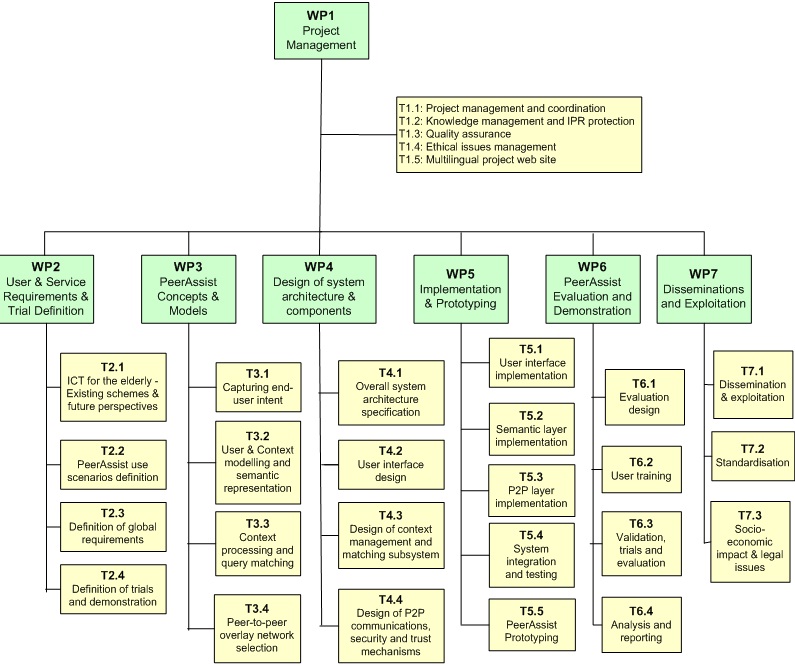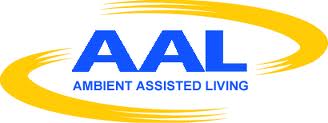The Project Workplan
The PeerAssist project is structured in seven (7) work packages (WPs), with each one including a number of well defined tasks. A summary of the WPs is provided below.WP1 addresses all the administrative activities, such as the project management and coordination, the knowledge management of the whole project and the quality control and assurance, ethical issues management and an active multilingual web-site development and maintenance. Five horizontal activities have been defined to cope with each one of the aforementioned tasks.
WP2 includes the initial technical work and preparation of the project. Its tasks will survey the state-of-the-art in ICT technologies for elderly support services, define interesting P2P use scenarios for the PeerAssist platform, and formulate the complete set of system requirements from all actor perspectives (end-users, service providers, care-givers etc). It will also define interesting use scenarios that demonstrate the value added of the system that will be implemented during the platform trials (WP6). The output of this wok package will directly feed WP3 and WP4.
WP3 focuses on the development of all concepts and models needed to support the PeerAssist system development. It includes parallel tasks for: defining user intent capturing methods suitable for the elderly people and compatible with the selected user interface technologies, context modelling and representation methods in the PeerAssist framework, personal assistant methods, context processing and query matching methods that will be efficient and effective for all categories of use scenarios identified in WP2, and the P2P overlay technology selection that meets the requirements defined in WP2 and is scalable. Its output will feed directly into WP4.
WP4 is concerned with the specification and design of all subsystems of the PeerAssist platform architecture that can meet the requirements identified in WP2, while using the mechanisms and algorithms developed in WP3. It includes parallel tasks for: mapping the functionality of the end-user interface methods to the specific technologies supported by the PeerAssist "Box", designing the software architecture for personal assistants, the context management, and semantic matching engines, adapting the selected P2P overlay network technology to the needs of the project in terms of distributed trust management and requests routing, and specifying the overall architecture and formalizing the interaction of all its subsystems (user interface, context modelling and processing, P2P layer, OSGi and UPnP core middleware to support local services. etc). The output of each task in WP4 feeds directly a corresponding task in WP5.
WP5 will handle the implementation of the PeerAssist prototype platform, based on the architecture and components specified in WP4. It has parallel tasks for the implementation of the user interface modules, the context modelling and processing modules, the P2P layer modules, as well as for the overall system integration, fine tuning, and its alpha and beta testing, in order to produce an end-to-end functional platform prototype that meets the requirements defined in WP2 and is in compliance with the specifications set in WP4. Finally it includes the development, testing, and fine tuning of a variety of PeerAssist applications compliant with the use cases defined in WP2.
WP6 is concerned with the preparation, user training, execution and assessment of the results of the trials for the PeerAssist platform. Two trials are planned, in different parts of Europe, one in Zaragoza, Spain, and one in Athens, Greece. An initial activity will deploy the integrated platform in a test area, where trials will take place in a controlled manner. Training and information material will be prepared for senior citizen end-users and support actors. Subsequently the platform will be used by a focus group that will be asked to provide feedback on the training material and on how well it handles the intended use scenarios defined in WP2. A final demonstration will be prepared after considering any fine tuning needed based on the received feedback.
WP7 is responsible for all dissemination and exploitation activities performed in the context of the PeerAssist project. This WP will promote the PeerAssist platform, through presentations in scientific conferences and exhibitions, circulation of posters and promotional material. Submission of research and technical publications in scientific journals will be actively pursued. Moreover, activities will also focus on the establishment of an effective exploitation strategy for the PeerAssist prototype, by identifying possibilities for a possible market introduction of the system as a value-added service offered to the elderly community by socially minded internet providers. Socio-economic impact and legal issues will be investigated.
The defined WP structure, along with the Tasks defined per WP is shown in the following figure:

Figure 1: Work packages and tasks

